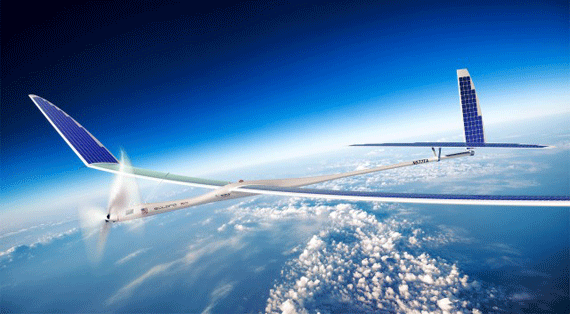
Facebook, with the thinly veiled veneer of “bringing internet access to the underconnected,” is looking to acquire Titan Aerospace — an American maker of high-altitude UAVs (drones).
The idea is that these Titan drones would be used to connect the 5 billion or so people who don’t yet have reliable internet access — a philanthropic act on the face of it, but when you consider that Facebook’s entire business model is predicated on continued growth, and that almost everyone in the world with an internet connection already has a Facebook account, you can see that this is more about self-preservation than humanitarianism.

Titan Aerospace has two products, the Solara 50 and Solara 60, which the company refers to as “atmospheric satellites.” They seem to be functionally identical, except the Solara 60 can carry a larger payload.
Both aircraft are powered by a large number of solar cells, allowing them to ascend to 65,000 feet (almost 20 kilometers), and then circle over a specific region for up to five years (presumably that’s the lifetime of the on-board lithium-ion batteries, which are required for night-time operation).
The high altitude is important: The FAA only regulates airspace up to 60,000 feet — above that, pretty much anything goes.
Once these atmospheric satellites are up there, there’s a wide range of possible applications.
Facebook is obviously interested in internet connectivity, but mapping, meteorology, global positioning, rapid response to disasters and wildfires, and a whole slew of other scientific and military applications are also possible.
- Chamisa under fire over US$120K donation
- Mavhunga puts DeMbare into Chibuku quarterfinals
- Pension funds bet on Cabora Bassa oilfields
- Councils defy govt fire tender directive
Keep Reading
As for what level of connectivity Facebook hopes to provide with these drones, it’s too early to say. TechCrunch reports that Facebook, which is looking to acquire Titan for $60 million, would launch 11,000 Solara 60 drones. Their coverage would begin with Africa, and then spread out from there.
There’s no word on how fast these connections might be, nor how much such a connection would cost the end user. Perhaps more importantly, there’s also no word on how Facebook intends to connect these 11,000 satellites to the internet. Facebook will need to build a lot of ground stations, perhaps in very remote and very hard to administer areas, and then run fiber to hook them up to the internet.
And yes, in case you were wondering, this effort appears to be very similar to Google’s Project Loon — which is essentially the same thing, but using big balloons instead of winged aircraft.
It’s worth pointing out that Titan hasn’t yet produced a commercial UAV. “Technology demonstrations” have been flown (probably much smaller prototypes), and “initial commercial operations” will start sometime in 2015.
Perhaps this is why Facebook is only paying $60 million for Titan, rather than the $19 billion it paid for WhatsApp.
While bringing internet access to the underconnected masses is really quite a noble undertaking, don’t ever mistake this for an altruistic act. One of Facebook’s most pressing problems is how to grow its user base.
Almost everyone who has an internet connection already has a Facebook account (or uses one of its national competitors, like Russia’s VKontakte). If Facebook doesn’t continue to grow, and doesn’t miraculously stumble across some way to make more money (its ads aren’t doing very well), the stock market will react very poorly indeed. Facebook is almost a victim of its own success — it got so big so quickly that it’s virtually impossible to continue the same growth trajectory.
Acquiring Instagram and WhatsApp were a savvy moves to bring in a few hundred million more users, but ultimately they were nothing more than stopgap measures. Bringing the next billion users online and into Facebook’s gribbly mandibles will be a very hard task indeed.
– Extreme Tech











